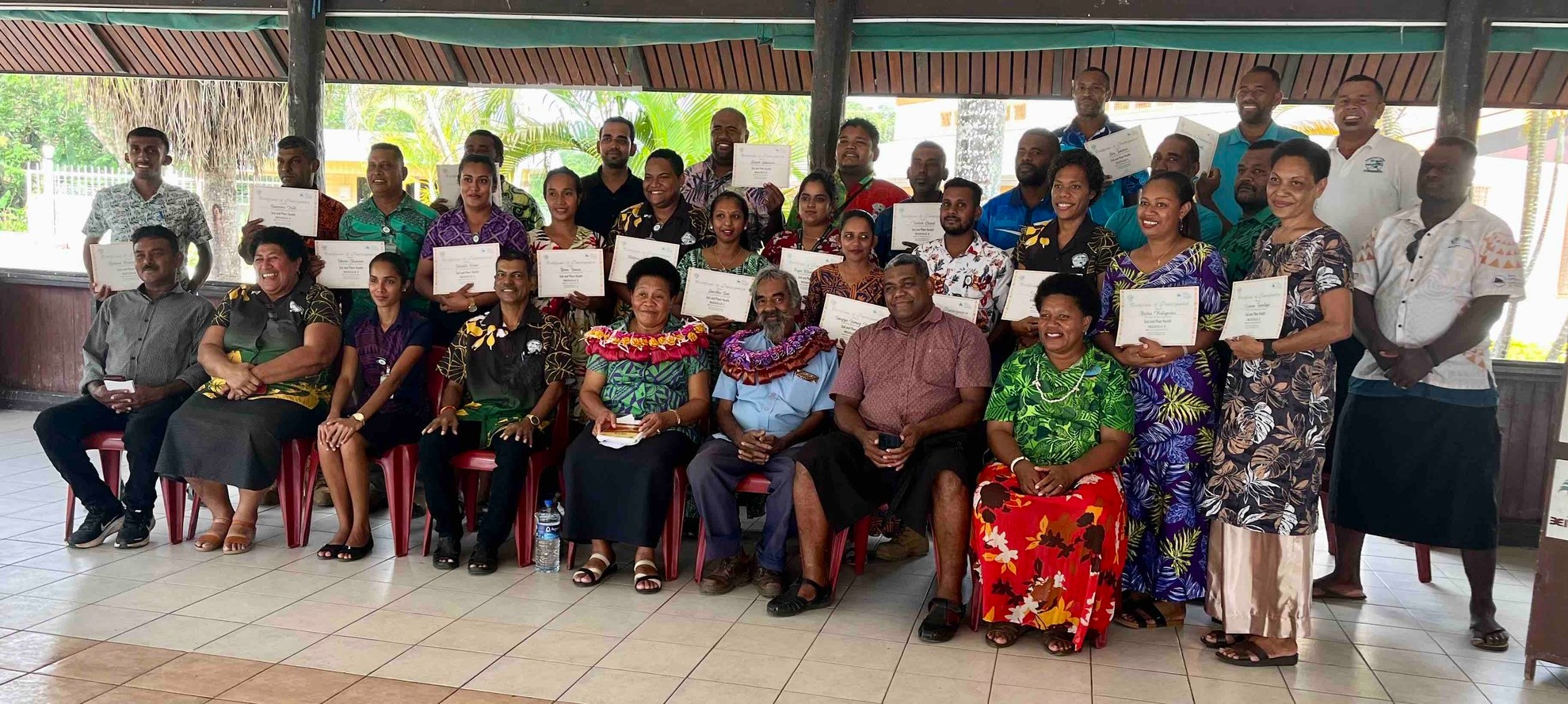UNDERSTANDING SOIL HEALTH IS IMPORTANT
May 27, 2024

Ministry of Agriculture and Waterways staff in the Northern
Division completed a short training on Integrating One Health Approach into
Soil and Plant Health.
In closing the workshop in Labasa on Friday 24th May, the Acting
Director for Crop Extension Services Division, Kasanita Ratu said that the
training is an important one as it strengthens staff knowledge on in the
Northern Division the importance of soil and the interconnectivity it is
involved with to provide daily services in meeting livelihoods.
“We must thank the Pacific Community (SPC) for working in
collaboration with the Ministry to make this training possible. We must
continue to work together to create more awareness on the importance of soils
and how it must be managed, protected and conserved for generations to come,”
explained Ms Ratu.
“Over the years, agriculture in Fiji has developed from
traditional agriculture to a more market driven sector. It is important that we
do not over exert the most important component of agriculture which is the soil
but to manage and protect it for years to come,” added Ms Ratu.
“The training program integrates the principles of One Health
into soil and plant health management. The One Health approach recognizes the
interconnectedness of human, animal, and environmental health, emphasizing the
need for holistic solutions to complex health challenges.”
“By applying this approach to soil and plant health, we aim to enhance
agricultural sustainability, food security, and environmental resilience.”
The One Health concept grew out of the accelerating pace of
emerging zoonotic disease outbreaks, and One Health efforts to combat emerging zoonosis
have included heightened biosecurity and surveillance, improved control of
livestock diseases, and attempts to limit the spread of antibiotic resistance.
Interventions focused on rebuilding soil health which can help
address a number of challenging problems relevant to the priorities of both One
Health and Planetary Health approaches.
By reducing pesticide use and promoting crop diversity,
regenerative farming methods can enhance the biodiversity of agricultural
fields and soil micro biomes, something essential for global biodiversity
conservation given the global acreage that agriculture consumes.
Better awareness and management of soil health could help reduce
the risk of soil-associated pathogens. The global spread of antimicrobial
resistance may be slowed by better management of soil micro biomes, although
such efforts must address the underlying complexity of soil biota.
At present, extension officers and other local agricultural
agents are unable to reliably recommend optimal nutrient inputs.
“Hence the reason for this training is to better equip and train
extension officers, agricultural agents, and farmers on “One health, Soil
Health and Plant health that will improve the physical, chemical and biological
properties of the soil in Vanua Levu."
Topics covered during the training included:
![]() Understanding
One Health Principles: Soil Health Management: Soil biology, chemistry, and
physics fundamentals. Techniques for soil testing and interpretation of
results.
Understanding
One Health Principles: Soil Health Management: Soil biology, chemistry, and
physics fundamentals. Techniques for soil testing and interpretation of
results.
![]() Soil
conservation practices, including cover cropping, conservation tillage, and
agroforestry. Composting and organic soil amendments for improving soil
fertility and structure.
Soil
conservation practices, including cover cropping, conservation tillage, and
agroforestry. Composting and organic soil amendments for improving soil
fertility and structure.
![]() Plant
Health Management: Identification and diagnosis of plant diseases, pests, and
nutrient deficiencies. Integrated pest management (IPM) strategies, emphasizing
biological control methods and cultural practices.
Plant
Health Management: Identification and diagnosis of plant diseases, pests, and
nutrient deficiencies. Integrated pest management (IPM) strategies, emphasizing
biological control methods and cultural practices.
![]() Practical
Training: Field demonstrations of soil sampling techniques and analysis
procedures. Hands-on exercises in pest and disease identification and organized
field trips.
Practical
Training: Field demonstrations of soil sampling techniques and analysis
procedures. Hands-on exercises in pest and disease identification and organized
field trips.
Officers who attended the three-day training which ended on
Friday 24th surely gained a comprehensive understanding of the One Health
approach and its application to soil and plant health management. They were
also empowered to work in collaboration and share knowledge among professionals
from diverse backgrounds.
The knowledge gained will certainly improve food security,
public health, and environmental sustainability in communities where
participants work and live.
-ENDS-
